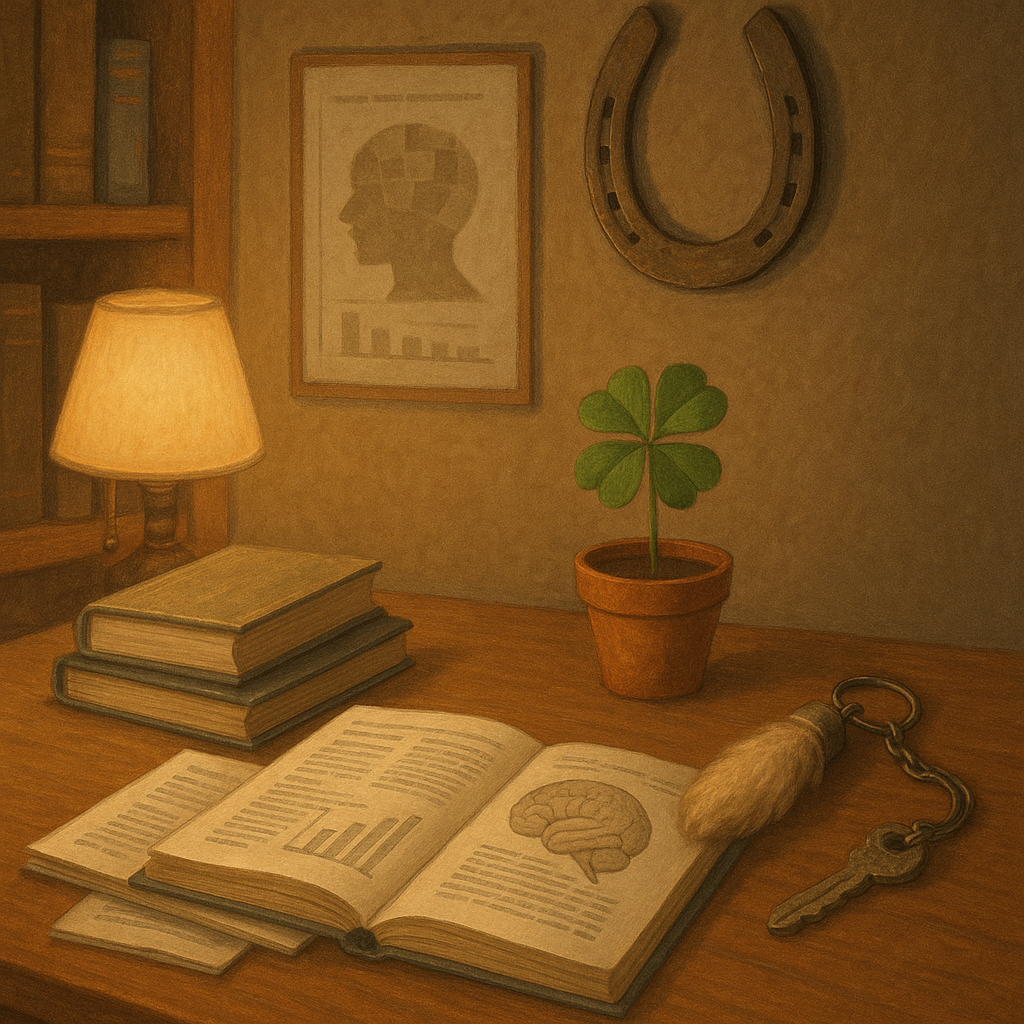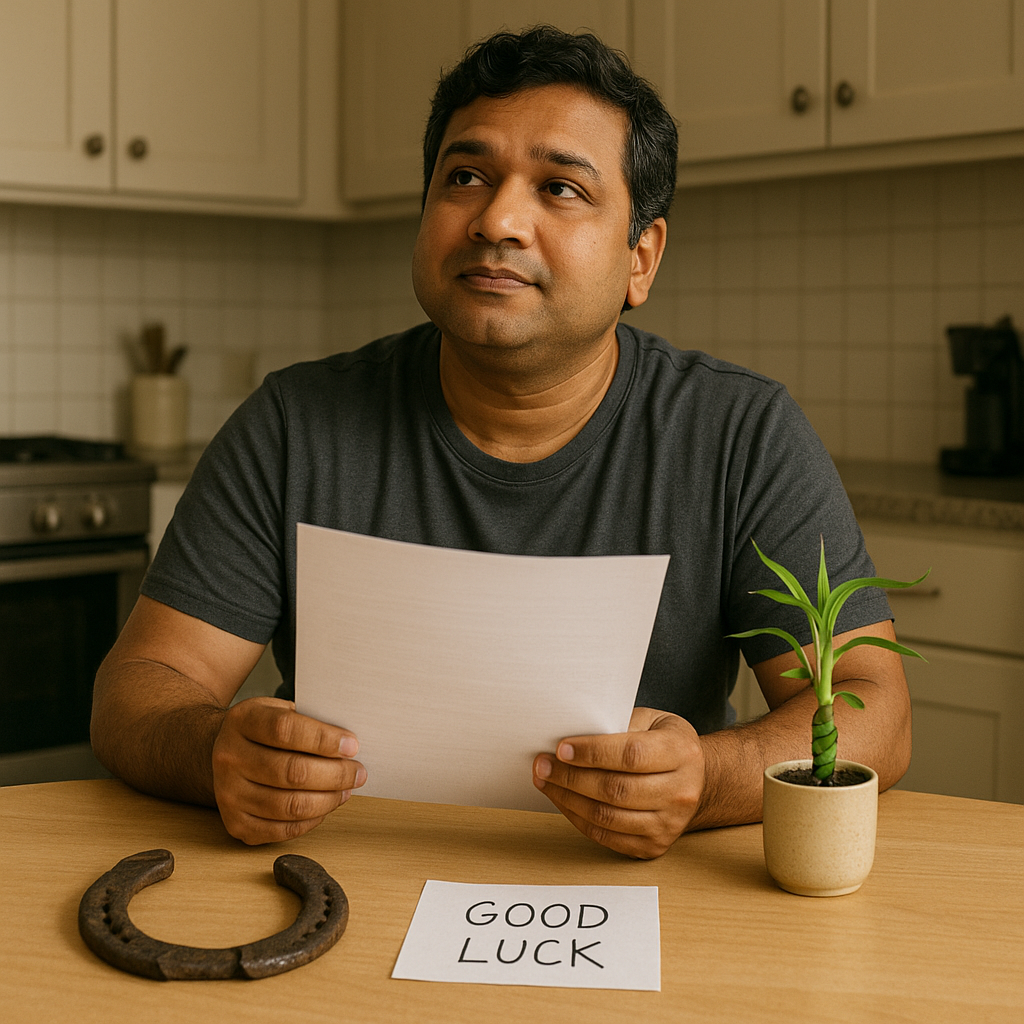The Lucky Edit by Do.Dreamss
How to Attract Luck in Life: Small Changes, Big Results
Luck isn't just a random force that favors some while avoiding others. In reality, what we perceive as "luck" is often the result of specific mindsets, behaviors, and approaches to life's opportunities. The good news? You can actively cultivate more luck in your life through intentional practices and perspective shifts.
In this comprehensive guide, you'll discover practical strategies to attract more positive experiences, recognize opportunities, and transform your relationship with luck. From scientific research to mindset techniques, these approaches can help you discover the power of dreams and luck in creating the life you desire.
Rethinking luck: science vs. superstition
When most people think about luck, images of four-leaf clovers, rabbit's feet, or horseshoes might come to mind. While these traditional symbols have cultural significance, there's actually scientific research examining the psychology behind what makes some people seemingly luckier than others.
Dr. Richard Wiseman, a psychologist who has extensively studied the science of luck, found that luck isn't magical—it's behavioral.
His decade-long research revealed that people who consider themselves lucky tend to notice more opportunities, listen to their intuition, maintain positive expectations, and adopt a resilient attitude toward life's challenges.
This doesn't mean that superstitions and cultural beliefs about luck have no value. Many traditions contain wisdom that aligns with psychological principles. For instance, carrying a "lucky charm" can boost confidence and positive expectations, which in turn may lead to better performance and outcomes—not because of supernatural forces, but because of how our minds work when we believe in ourselves.
The most balanced approach combines respect for traditional perspectives with practical psychological insights. Understanding the science of luck allows us to take actionable steps while appreciating the comfort that cultural practices around luck can provide during uncertain times.
The mindset shift: programming yourself for luck
Your thoughts and beliefs dramatically influence how you experience life's events, including whether you notice and seize "lucky" opportunities. Cultivating a mindset that attracts positive experiences begins with intentional mental practices.
Affirmations that attract fortune
Daily positive self-talk can rewire your brain to recognize opportunities. Try statements like: "I attract good fortune effortlessly" or "Opportunities find me easily." Repeat these affirmations during morning routines or before challenging situations to build a positive mindset for luck.
The gratitude practice
People who practice daily gratitude report experiencing more positive events. When you regularly acknowledge good things in your life, your reticular activating system (the brain's filtering mechanism) becomes primed to notice more positive situations.
Start by listing three things you're grateful for each morning or evening.
Include even small fortunate moments—like finding a parking spot quickly or receiving an unexpected compliment. This practice trains your mind to spot good fortune everywhere.
Visualization techniques
Successful people often visualize positive outcomes before they happen. Spend 5-10 minutes daily imagining yourself experiencing lucky breaks, handling opportunities well, or navigating challenges successfully. This mental rehearsal prepares you to recognize and respond effectively when real opportunities arise.
Challenging limiting beliefs
Many of us carry unconscious beliefs that block our experience of luck, such as "good things don't happen to people like me" or "I always miss out." Identify these thoughts and actively replace them with more empowering perspectives like "I'm as deserving of good fortune as anyone else" or "I'm constantly growing in my ability to create positive circumstances."
Consider incorporating luck-attracting rituals into your daily life, such as embracing handmade jewelry that embodies luck and success as a physical reminder of your intentions and aspirations.
Proactive action: creating and noticing more opportunities
While mindset creates the foundation, taking consistent action dramatically increases your "luck surface area"—the number of situations where positive opportunities can find you.
Expanding your comfort zone
Fortunate circumstances rarely arrive when we're stuck in routine. By regularly trying new activities, visiting different places, or engaging with unfamiliar subjects, you increase your chances of stumbling upon unexpected opportunities. Start small—take a different route to work, try a new cuisine, or attend an event outside your usual interests.
Networking for serendipity
Many "lucky breaks" come through other people. The more diverse your social connections, the greater your exposure to opportunities.
Make it a habit to meet new people regularly, reconnect with old acquaintances, and participate in communities aligned with your interests and goals.
Remember to approach networking with genuine curiosity rather than calculation. The strongest connections—and often the luckiest opportunities—form when you focus on how you can help others rather than what you can gain.
Taking strategic risks
Fortune favors those willing to take thoughtful chances. This doesn't mean reckless behavior, but rather calculated risks that move you toward your goals. Start with small risks like speaking up in meetings, sharing creative ideas, or applying for positions slightly beyond your current experience level.
Each small risk builds confidence for larger ones, creating a positive cycle where each success emboldens you to pursue more significant opportunities. To become a luckier person, establish a practice of taking at least one small risk weekly.
Listening to intuition
Your intuition often processes information below your conscious awareness. Studies show that people who report more luck tend to trust and act on their hunches more frequently.
Practice tuning into your gut feelings through brief moments of mindfulness throughout the day. When facing decisions, ask yourself what feels right beneath logical considerations. While intuition shouldn't replace critical thinking, it often provides valuable guidance toward fortunate paths.
Remember that opportunities and luck often appear when we're actively engaged in life rather than passively waiting. As you read more about our belief in luck and the power of dreams, you'll discover how consistent action creates the conditions for good fortune.
Preparation meets opportunity: how habits and learning set the stage for luck
The famous quote "Luck is what happens when preparation meets opportunity" highlights how personal development creates a foundation for fortunate circumstances. By cultivating certain habits, you position yourself to benefit from chance events that others might miss.
Continuous learning
Knowledge expands your ability to recognize valuable opportunities. Those who appear lucky often work smarter, not just harder, to prepare for big opportunities. They stay curious and develop diverse skills that make them adaptable to unexpected situations.
Dedicate time each week to learning something new—whether through books, courses, podcasts, or conversations with knowledgeable people. This knowledge base helps you spot patterns and connections others miss.
Goal clarity
Having clear goals acts like a filter that helps you notice relevant opportunities. When you know exactly what you're working toward, your brain becomes remarkably efficient at spotting resources, connections, and circumstances that support those goals.
Review and refine your goals regularly, making them specific enough to guide your attention while remaining flexible enough to accommodate unexpected good fortune.
Consistency and persistence
What looks like overnight success or extraordinary luck is often the result of consistent effort over time. By showing up regularly for your goals and persisting through challenges, you create more opportunities for luck to find you.
Develop daily habits that move you toward your objectives, no matter how small the progress might seem. These consistent actions compound over time, creating momentum that attracts favorable circumstances.
Cultivating helpful rituals
Personal rituals can focus your mind, build confidence, and create a psychological environment conducive to recognizing opportunities. Whether it's a morning practice, a pre-meeting routine, or embracing handmade jewelry that attracts positive energy and luck, these rituals can serve as powerful reminders of your intentions and capabilities.
Transforming misfortune: turning bad luck into good
Perhaps the most important skill for attracting luck isn't avoiding misfortune but transforming it into advantage. Research shows that people who consider themselves lucky approach setbacks differently than those who feel perpetually unlucky.
Reframing negative events
While facing disappointments, "lucky" people ask themselves: "How might this actually benefit me?" or "What opportunities does this create?"
This isn't blind optimism but a practical approach to finding hidden advantages.
When experiencing setbacks, practice the habit of identifying at least three potential positives that could emerge from the situation. This trains your mind to automatically search for opportunity within challenge.
Learning from failure
Every misstep contains valuable information. By adopting a growth mindset that views failures as feedback rather than final judgments on your capabilities, you transform setbacks into stepping stones toward future success.
After any disappointment, take time to reflect on specific lessons learned. Ask: "What will I do differently next time?" and "What strengths did I discover through this challenge?" This practice builds resilience while extracting maximum value from difficult experiences.
Maintaining perspective
People who experience consistent luck tend to contextualize negative events appropriately. They recognize when setbacks are temporary and specific rather than permanent and pervasive.
When facing challenges, remind yourself: "This is one moment, not my entire life" and "This affects one area, not everything." This perspective prevents catastrophizing and helps you bounce back more quickly.
Finding the hidden gift
Many successful people attribute their greatest achievements to initial disappointments that forced them to change direction. By actively looking for the hidden gift in apparent misfortune, you align yourself with the law of attraction and luck.
When doors close unexpectedly, ask yourself what new doors might now be visible. Sometimes what feels like bad luck is actually redirecting you toward a much better path.
Conclusion
Attracting luck isn't about finding magical shortcuts or relying on supernatural forces. It's about cultivating specific mindsets and behaviors that increase your exposure to positive opportunities while enhancing your ability to recognize and benefit from them.
Begin with small changes—a daily gratitude practice, weekly comfort-zone stretches, consistent learning habits, and a resilient approach to challenges. Over time, these practices compound to create what others might perceive as extraordinary luck but is actually the natural result of how you're engaging with the world.
Remember that lasting luck stems from habits and perspective shifts rather than quick fixes or superstitions. By implementing these evidence-based approaches consistently, you'll gradually transform your relationship with fortune and create a life where good luck becomes your natural state.
For those ready to infuse more luck into daily life, consider incorporating intentional rituals and symbolic reminders that reinforce your commitment to creating your own good fortune.
Frequently asked questions
Can you really change how lucky you are in life?
Yes, research shows that adopting certain mindsets and habits—like looking for opportunities, acting on hunches, and interpreting events positively—can significantly increase how often you experience luck.
What daily habits help attract more luck?
Practicing gratitude, being open to new experiences, networking, working smart, and adopting "lucky" rituals can all boost your odds of experiencing fortunate events.
Is luck more about mindset or actions?
Both are essential. Mindset helps you notice and act on opportunities, while taking consistent action exposes you to serendipity. The most "lucky" people excel at both.
Does believing in luck really make a difference?
Studies indicate that people who carry lucky charms or simply believe they're lucky actually perform better and are more persistent.
Are there products or rituals proven to attract luck?
While no product can guarantee luck, many find that items with symbolic meaning—like jewelry representing luck and dreams—boost confidence, optimism, and the likelihood of acting on opportunities.








